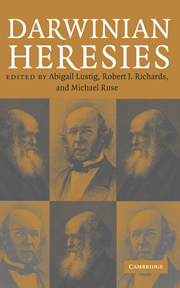Book contents
- Frontmatter
- Contents
- List of Contributors
- 1 Introduction: Biologists on Crusade
- 2 Russian Theoretical Biology between Heresy and Orthodoxy: Georgii Shaposhnikov and His Experiments on Plant Lice
- 3 The Specter of Darwinism: The Popular Image of Darwinism in Early Twentieth-Century Britain
- 4 Natural Atheology
- 5 Ironic Heresy: How Young-Earth Creationists Came to Embrace Rapid Microevolution by Means of Natural Selection
- 6 If This Be Heresy: Haeckel's Conversion to Darwinism
- 7 Adaptive Landscapes and Dynamic Equilibrium: The Spencerian Contribution to Twentieth-Century American Evolutionary Biology
- 8 “The Ninth Mortal Sin”: The Lamarckism of W. M. Wheeler
- 9 Contemporary Darwinism and Religion
- Index
7 - Adaptive Landscapes and Dynamic Equilibrium: The Spencerian Contribution to Twentieth-Century American Evolutionary Biology
Published online by Cambridge University Press: 11 July 2009
- Frontmatter
- Contents
- List of Contributors
- 1 Introduction: Biologists on Crusade
- 2 Russian Theoretical Biology between Heresy and Orthodoxy: Georgii Shaposhnikov and His Experiments on Plant Lice
- 3 The Specter of Darwinism: The Popular Image of Darwinism in Early Twentieth-Century Britain
- 4 Natural Atheology
- 5 Ironic Heresy: How Young-Earth Creationists Came to Embrace Rapid Microevolution by Means of Natural Selection
- 6 If This Be Heresy: Haeckel's Conversion to Darwinism
- 7 Adaptive Landscapes and Dynamic Equilibrium: The Spencerian Contribution to Twentieth-Century American Evolutionary Biology
- 8 “The Ninth Mortal Sin”: The Lamarckism of W. M. Wheeler
- 9 Contemporary Darwinism and Religion
- Index
Summary
It would be quite justifiable to ignore Spencer totally in a history of biological ideas because his positive contributions were nil.
Ernst Mayr, The Growth of Biological ThoughtThe standard history of evolutionary biology – the history I myself was writing some two or more decades ago – runs something like this: In the Origin of Species, published in 1859, Charles Darwin tried to do two things. First, he wanted to establish the fact of evolution. Second, he proposed a mechanism for evolution – natural selection brought on by a struggle for existence. Darwin was successful in his first aim. Very soon after the publication of his book, most of the educated world – scientists and laypeople – was converted to evolutionism. It became the accepted way of thinking about life's origins, including our own. Darwin was unsuccessful in his second aim. Almost no one took up natural selection as a working cause of evolutionary change – rather, a host of alternatives were preferred, including Lamarckism (the inheritance of acquired characteristics), saltationism (evolution by jumps), orthogenesis (lines of development that take on their own momentum), and others. The triumph of selection as a mechanism had to wait until the twentieth century. It was only then that biologists made the required major advances in our understanding of the mechanisms of heredity and developed the science now known as “genetics.”
- Type
- Chapter
- Information
- Darwinian Heresies , pp. 131 - 150Publisher: Cambridge University PressPrint publication year: 2004
- 8
- Cited by



